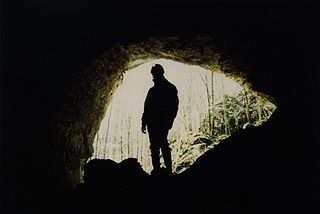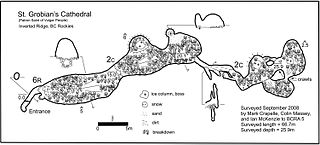
Speleology is the scientific study of caves and other karst features, as well as their make-up, structure, physical properties, history, life forms, and the processes by which they form (speleogenesis) and change over time (speleomorphology). The term speleology is also sometimes applied to the recreational activity of exploring caves, but this is more properly known as caving, potholing, or spelunking. Speleology and caving are often connected, as the physical skills required for in situ study are the same.

The Yorkshire Dales is an upland area of the Pennines in the historic county of Yorkshire, England, most of it in the Yorkshire Dales National Park created in 1954.

The National Speleological Society (NSS) is an organization formed in 1941 to advance the exploration, conservation, study, and understanding of caves in the United States. Originally headquartered in Washington D.C., its current offices are in Huntsville, Alabama. The organization engages in the research and scientific study, restoration, exploration, and protection of caves. It has more than 10,000 members in more than 250 grottos.
Formed in 1956, the Australian Speleological Federation Inc. (ASF) is the national body representing those interested in the protection and sustainability of Australia's cave and karst environments. It has approximately 850 members across 28 constituent bodies throughout all Australian states and territories.
Eli "Cymmie" Simpson was an influential and controversial British caver and speleologist, and a founding member and Recorder of the British Speleological Association.

A cave survey is a map of all or part of a cave system, which may be produced to meet differing standards of accuracy depending on the cave conditions and equipment available underground. Cave surveying and cartography, i.e. the creation of an accurate, detailed map, is one of the most common technical activities undertaken within a cave and is a fundamental part of speleology. Surveys can be used to compare caves to each other by length, depth and volume, may reveal clues on speleogenesis, provide a spatial reference for other areas of scientific study and assist visitors with route-finding.
Trevor David Ford, OBE was an English geologist, specialising in speleology, and an author. He was a Senior Lecturer in the Geology Department of the University of Leicester, and also Associate Dean of Science.

Mossdale Caverns is a cave system in the Yorkshire Dales, England. It is about 5 kilometres (3.1 mi) north of Grassington, and east of Conistone, where Mossdale Beck sinks at the base of Mossdale Scar. It lies at an altitude of 425 metres (1,394 ft) on the eastern flank of Wharfedale, and extends south-east beneath Grassington Moor.
There are a number of caving organizations throughout the world.

Recreational caving in the United Kingdom dates back to the mid-19th century. The four major caving areas of the United Kingdom are North Yorkshire, South Wales, Derbyshire, and the Mendips. Minor areas include Devon, North Wales, and the Scottish Highlands.

Named after Eli Simpson, Simpson Pot is a limestone cave in West Kingsdale, North Yorkshire, England. It leads into Swinsto Cave and thence into Kingsdale Master Cave, and it is popular with cavers as it is possible to descend it by abseiling down the pitches, retrieving the rope each time, and exiting through Valley Entrance of Kingsdale Master Cave at the base of the hill. It is part of a 27-kilometre (17 mi) long cave system that drains both flanks of Kingsdale.
Cave conservation is the protection and restoration of caves to prevent or minimise the effects of human activities.
British Speleological Association (BSA) was founded by Eli Simpson and others in 1935. It was instrumental in the discovery of Lancaster Hole and other caves. In 1973, it merged with the Cave Research Group of Great Britain to form the British Cave Research Association (BCRA).

The British Caving Association (BCA) is the sports governing body for caving in the United Kingdom. It is recognised by UK Sport, Sport England and SportScotland.

Marjorie Mary Sweeting, was a British geomorphologist specializing in karst phenomena. Sweeting had gained extensive knowledge on various topographies and landscapes, by travelling around the world to places such as Greece, Australia, Czechoslovakia, United States, Canada, South Africa, Belize, and most notably China. She published Karst Landforms, and Karst in China: its Geomorphology and Environment after many years of work there starting in 1977. The latter is the first comprehensive Western account of China's karst, one of the first western published works on the karst found within China, even in a male dominated field.
The Mendip Cave Registry and Archive (MCRA) has the object of recording and indexing all available information on caves, mines, rock shelters and other sites of speleological interest primarily in the area of Bristol, Somerset, Bath and Wiltshire in South West England.

Mirko Malez was a prominent Croatian palaeontologist, speleologist, geo-scientist, ecologist and natural history writer. He was known as a "pioneer of Croatian speleoarchaeology". He was a member of the Yugoslav Academy, JAZU (present-day Croatian, HAZU - Croatian Academy of Sciences and Arts and one of only four Croatian PhDs of speleology. Thanks to Malez's popularization of science, Varaždin County, in northern Croatia, is also known as a "cradle of the Palaeolithic age".

The Austrian Speleological Association is a national caving organization was founded as an umbrella organization of 26 Austrian caving clubs in 1949.

Swinsto Cave is a limestone cave in West Kingsdale, North Yorkshire, England. It leads into Kingsdale Master Cave and it is popular with cavers as it is possible to descend by abseiling down the pitches, retrieving the rope each time, and exiting through Valley Entrance of Kingsdale Master Cave at the base of the hill. It is part of a 27-kilometre (17 mi) long cave system that drains both flanks of Kingsdale.












